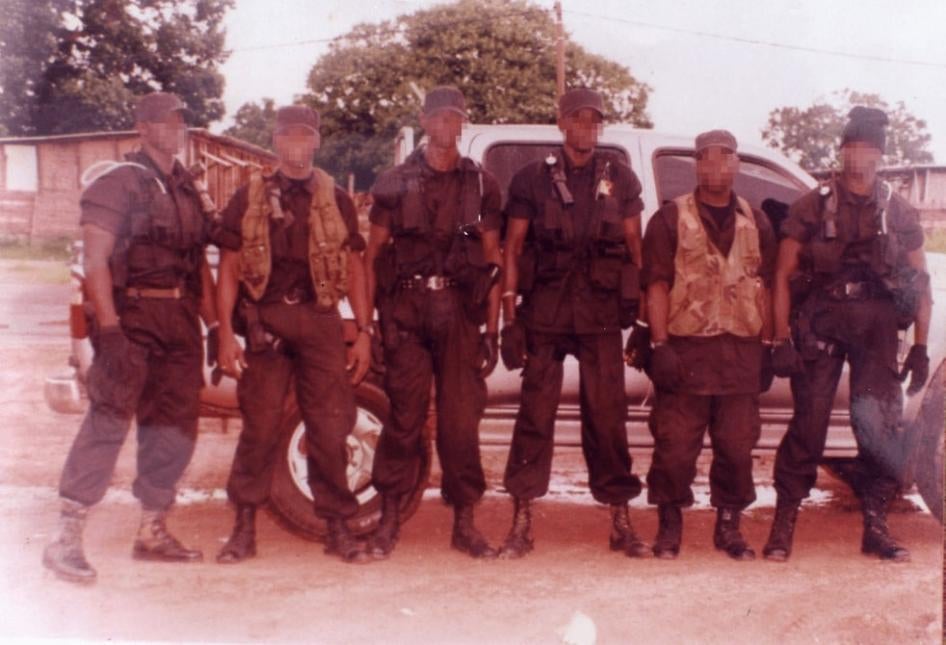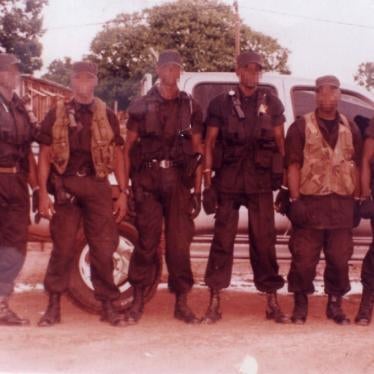- Who is Bai L. and what are the charges against him?
- Why is Bai L.’s trial taking place in Germany?
- What was the situation in The Gambia during the time the alleged crimes were committed?
- Who were the victims of Bai L.’s alleged crimes?
- How are survivors involved in the proceedings?
- Could Yahya Jammeh or other high-level officials be prosecuted for serious crimes committed in Gambia?
- Is anyone else being prosecuted under universal jurisdiction for crimes committed in Gambia during the Jammeh era?
- How many cases related to serious crimes have been opened in Germany?
- How long is the trial expected to last and what are the possible outcomes?
- How accessible is the trial to the public and journalists for affected communities in Gambia?
- What is the role of nongovernmental groups in these proceedings?
1. Who is Bai L. and what are the charges against him?
Bai L. is a 46-year-old Gambian citizen who is alleged to have been a member of the “Junglers” death squad, a paramilitary unit also known as the “Patrol Team” created by the former Gambian President Yahya Jammeh.
Bai L. is charged with three counts of crimes against humanity. German prosecutors accuse Bai L. of being a former driver for the Junglers, who was involved in the attempted murder of Ousman Sillah, a lawyer, in 2003, as well as in the murders of Deyda Hydara, a journalist, in 2004, and of Dawda Nyassi, a perceived political opponent of Jammeh’s, in 2006.
This trial in the German city of Celle will be the first to prosecute human rights violations committed in Gambia during the Jammeh era on the basis of universal jurisdiction. Bai L. has been in pretrial detention since his arrest in Germany in March 2021.
2. Why is Bai L.’s trial taking place in Germany?
His trial in Germany is possible because the country’s laws recognize universal jurisdiction over certain serious crimes under international law, allowing for the investigation and prosecution of these crimes no matter where they were committed, and regardless of the nationality of the suspects or victims.
Universal jurisdiction cases are increasingly important in international efforts to hold those responsible for atrocities accountable, to provide justice to victims who have nowhere else to turn, to help deter future crimes, and to help ensure that countries do not become safe havens for human rights abusers.
A number of European countries have ongoing investigations and prosecutions related to grave abuses committed abroad in places such as the Democratic Republic of Congo, Iraq, Liberia, and Syria.
German authorities have been leaders in conducting prosecutions on the basis of universal jurisdiction. In January, a German court convicted a former Syrian intelligence officer for crimes against humanity and sentenced him to life in prison in a first case of this kind in Germany.
3. What was the situation in The Gambia during the time the alleged crimes were committed?
Under Yahya Jammeh’s 22-year rule, there was a policy of systematic oppression of any of his real or perceived opponents in an effort to maintain his political power. The government targeted journalists; human rights defenders; student leaders; religious leaders; political opposition members; judiciary officials; lesbian, gay, bisexual, and transgender (LGBT) people; and security force personnel, among others. This resulted in serious human rights violations, including torture, extrajudicial killings, enforced disappearance, and sexual violence.
Many of these human rights violations were brought to light during the hearings of Gambia’s Truth, Reconciliation and Reparations Commission (TRRC), which was set up in 2018. A total of 393 witnesses, including victims and former government insiders, testified during over two years of public hearings.
Witnesses linked Jammeh to the killing and torture of political opponents, the murder of West African migrants, and “witch hunts” in which hundreds of people were arbitrarily detained, among other crimes. They also alleged that Jammeh raped and sexually assaulted women and ran a sham HIV-treatment program.
4. Who were the victims of Bai L.’s alleged crimes?
Deyda Hydara was a renowned Gambian journalist, co-founder, and primary editor of The Point Newspaper, AFP and a Reporters Without Borders' (RSF) correspondent in the country. Hydara was killed on December 16, 2004.
Ousman Sillah was one of the lawyers for Baba Jobe, former leader of the parliament majority who had been close to Jammeh but was later jailed for alleged tax evasion. Jobe died under controversial circumstances while in prison. Sillah survived an attack on his life.
Dawda Nyassi was a Gambian citizen who had gone to fight in Liberia’s civil war. When he returned to Gambia, Jammeh allegedly ordered his murder as he suspected Nyassi of having plans to overthrow him.
Gambia’s TRRC also called for Bai L.’s prosecution in the murder of 59 West African migrants in 2005 and groups have called for German authorities to investigate this massacre.
5. How are survivors involved in the proceedings?
Deyda Hydara’s son, Baba Hydara, who is also a journalist, is a joint plaintiff in the trial against Bai L.
Under German law, a victim of the crimes charged in the trial or a family member of a victim who was killed can join a criminal proceeding as a joint plaintiff, thereby becoming a formal party to the proceeding.
Joint plaintiffs play a critical role in proceedings. Joint plaintiffs and their lawyers can be present at the trial and have the right to: (i) request information on the status of the proceedings; (ii) make statements in court; (iii) access files; (iv) request that further evidence be taken; and (v) ask questions of witnesses and experts.
6. Could Yahya Jammeh or other high-level officials be prosecuted for serious crimes committed in Gambia?
Gambia’s TRRC concluded that Jammeh and his associates committed crimes against humanity and called for their prosecution.
The trial of Bai L. will further shed light on the political context in which massive human rights violations committed in Gambia during the Jammeh era took place, and more specifically on the “Junglers,” who were allegedly ordered to commit them by the former president.
This trial may be a step on the way to ensure that Jammeh and others implicated in the crimes will face fair, credible trials in Gambia or outside the country, as needed.
Jammeh has been in exile in Equatorial Guinea since 2017, following the election of Gambia’s current president, Adama Barrow.
The TRRC briefly considered how any prosecutions should be carried out in Gambia. It rejected the idea of a purely domestic tribunal because of deficiencies in Gambia’s legal system, capacity, and infrastructure, and recommended creating an “internationalized” tribunal.
Since 2019, the Gambia Bar Association has independently led a series of multi-stakeholder consultations on how any trials should be conducted. These discussions have resulted in a consensus in favor of a “hybrid” court, anchored on a treaty with Economic Community of West African States (ECOWAS),and with Gambian and international staff, to create a framework tailored to the prosecution of Jammeh-era crimes and build the capacity of the national justice system.
Gambia’s government is now reviewing the TRRC’s recommendations and must publish a white paper by May 25, 2022, detailing steps it will take to carry out the TRRC Report.
7. Is anyone else being prosecuted under universal jurisdiction for crimes committed in Gambia during the Jammeh era?
Bai L. is not the first person to have been indicted for crimes committed in Gambia under Jammeh. Another alleged Jungler, Michael Correa, 43, was indicted in the United States in June 2020. Correa faces charges of torturing detainees following a failed coup attempt in Gambia in 2006.
In Switzerland, an investigation has been ongoing against former Interior Minister Ousman Sonko since 2017, when he was arrested after the nongovernmental organization TRIAL International filed a criminal complaint against him for alleged crimes of torture.
8. How many cases related to serious crimes have been opened in Germany?
TRIAL International’s Universal Jurisdiction Annual Review (UJAR) highlights the main developments of international crimes cases brought before domestic jurisdictions on the basis of universal jurisdiction.
The 2022 edition of the UJAR reports on more than 60 cases of international crimes, including 15 brought before German jurisdictions. Among these cases, 11 relate to crimes committed in Syria, two to crimes committed in Iraq, one in Argentina, and one in Gambia.
9. How long is the trial expected to last and what are the possible outcomes?
The trial in the Higher Regional Court of Celle is expected to last at least until the beginning of 2023. If convicted, Bai L. could face up to life in prison. Judgments by Higher Regional Courts in Germany can be appealed at the German Federal Supreme Court.
10. How accessible is the trial to the public and journalists for affected communities in Gambia?
Due to Covid-19 restrictions, there will be a limited number of seats available for the public. According to the March 30, 2022 news release of the Higher Regional Court of Celle, 15 seats will be available for accredited journalists, but only one of them for Gambian journalists.
The trial will be conducted in German without public interpretation, which will make it less accessible to non-German speaking members of the Gambian community interested in the trial. The verdict will only be available in German, and no official transcript in any language will be provided once the trial concludes.
The Higher Regional Court in Celle did, however, publish a news release about the opening of the trial in English.
To be meaningful, justice should not only be done, but be seen to be done. German universal jurisdiction trials have lacked accessibility for victims of the crimes being prosecuted, and other third parties. The lack of interpretation was also criticized in a trial against two former Syrian intelligence officials that took place in the city of Koblenz.
People who want to follow the trial are dependent on the reporting by journalists and nongovernmental groups. German courts conducting universal jurisdiction trials should provide interpretation for affected communities whose members want to follow the proceedings.
11. What is the role of nongovernmental groups in these proceedings?
Victims’ groups and nongovernmental organizations have been in the forefront of the effort to hold Jammeh-era officials to account and have formed the Jammeh2Justice campaign. International nongovernmental organizations such as TRIAL International, Human Rights Watch, and the International Commission of Jurists continue to investigate serious human rights violations committed during the Jammeh presidency and provide support to victims and the joint plaintiff in the German proceedings.
Together with the European Center for Constitutional and Human Rights, TRIAL International contacted the German prosecution authorities in August 2019 to report Bai L.’s presence in Germany along with making an inquiry as to whether an investigation against Bai L. was already underway.
Following the arrest of Bai L. in Germany in 2021, TRIAL International provided additional information to the German prosecution authorities in May 2021 regarding Bai L.’s alleged involvement in the offenses, namely radio interviews given by Bai L. and translated by Human Rights Watch, as well as relevant testimony heard by the TRRC.
This question-and-answer document has been prepared by Human Rights Watch, the International Commission of Jurists, TRIAL International, and Reporters Without Borders.








